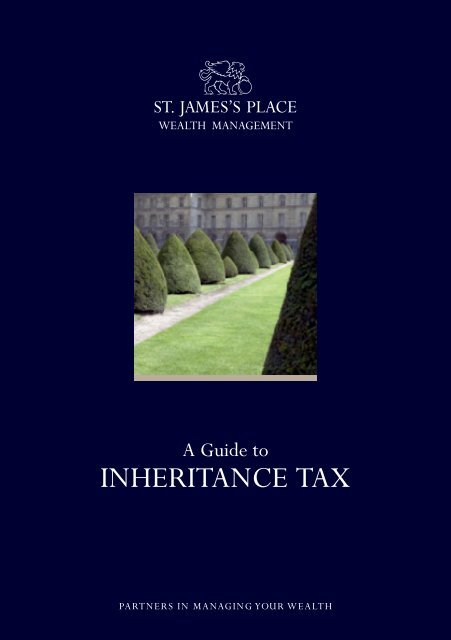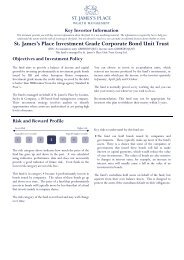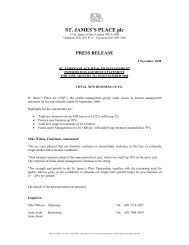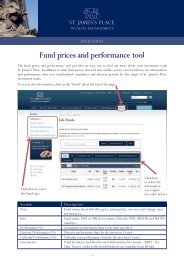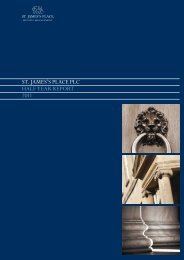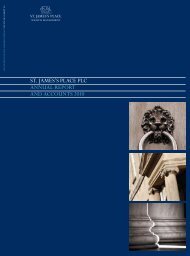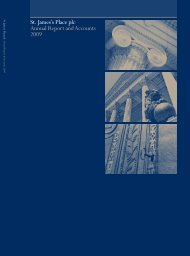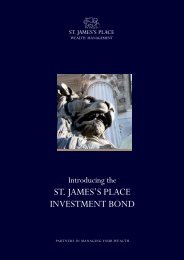A Guide To INHERITANCE TAX - St James's Place
A Guide To INHERITANCE TAX - St James's Place
A Guide To INHERITANCE TAX - St James's Place
You also want an ePaper? Increase the reach of your titles
YUMPU automatically turns print PDFs into web optimized ePapers that Google loves.
A <strong>Guide</strong> to<br />
<strong>INHERITANCE</strong> <strong>TAX</strong><br />
PARTNERS IN MANAGING YOUR WEALTH
Contents<br />
Inheritance Tax – some facts 3<br />
Inheritance Tax – what it means to you 5<br />
What to do about Inheritance Tax 7<br />
Your Will 8<br />
Using trusts 9<br />
Gifting 10<br />
Tax efficient funds 11<br />
Pensions and life assurance 12<br />
Summary 13<br />
About <strong>St</strong>. James’s <strong>Place</strong> 14
Inheritance Tax – some facts<br />
Whether we like it or not the inescapable fact is that, one<br />
day, we are all going to die.<br />
And unless we are very careful our families could end<br />
up, like many people before them, paying a sum to Her<br />
Majesty’s Revenue and Customs (HMRC) in Inheritance<br />
Tax (IHT).<br />
There was a time when IHT was solely the concern of the<br />
very wealthy, however the value of residential property<br />
now means that this is no longer the case.
An estate will be subject to IHT if, on death, it exceeds<br />
the individual Nil Rate Band. The Government has<br />
announced that the Nil Rate Band will be £325,000 until<br />
at least 2014/2015. Since October 2007, it has also been<br />
possible to use any unused proportion of a Nil Rate Band<br />
from a deceased spouse or registered civil partner.<br />
Inheritance Tax revenue raised in 2010/11 by the<br />
Government was calculated by Her Majesty’s Revenue &<br />
Customs (HMRC) to be £2.7 billion * .<br />
Source<br />
*<br />
HMRC
Inheritance Tax what it<br />
means to you<br />
IHT is affecting a rapidly growing number of people, most<br />
of whom would prefer their hard-earned assets to pass to<br />
their families when they die.<br />
Yet a large proportion of their wealth or estate, including<br />
the family home, investments, insurance policies not in<br />
trust or even family heirlooms, might have to be sold in<br />
order to meet the IHT liability on death if proper steps<br />
have not been taken to protect their wealth.<br />
Don’t assume that moving or living abroad will get<br />
you off the hook either. Your overseas assets, such as a<br />
second home, continue to be liable to IHT if you remain<br />
domiciled in the UK. If you move abroad, UK-based<br />
assets are likely to remain taxable and even if you die<br />
several years later, HMRC may still be able to argue that<br />
worldwide assets are assessable for IHT. This is because<br />
it is only your ‘domicile’ that is relevant for UK IHT.<br />
5<br />
PARTNERS IN MANAGING YOUR WEALTH
By living abroad for a few years, you may have become ‘nonresident’<br />
but the UK tax authorities may still regard you as a<br />
‘UK-domicile’. Although you can take steps to demonstrate<br />
you have changed your ‘domicile’, HMRC is unlikely to<br />
confi rm that this has been achieved until you have died, so<br />
careful contingency planning is always advisable.<br />
Your domicile is typically influenced by the domicile<br />
of your parents but also your place of birth and where<br />
you have been brought up. You can change domicile by<br />
moving permanently abroad, but to achieve this you would<br />
effectively need to sever all ties with the UK, such as<br />
ceasing to own a UK property or belonging to a UK club.<br />
So how do you determine your IHT exposure?<br />
The calculation is often, although not always, simple.<br />
Broadly, you count up the value of all the assets remaining<br />
on death, subtract the Nil Rate Band and what is left is<br />
taxed at 40%. If your spouse dies before you without fully<br />
using their Nil Rate Band the proportion of the unused<br />
amount can be carried forward to use on your death.<br />
However it is still legally possible to ensure that as much<br />
of your estate as possible stays out of HMRC’s grasp –<br />
and that can be done by seeking specialist, professional<br />
advice. Careful IHT planning is all about passing as<br />
much of the proceeds of an estate as possible to chosen<br />
beneficiaries rather than to HMRC. It is also about<br />
maintaining flexibility and control over any arrangements<br />
that are made.<br />
6<br />
PARTNERS IN MANAGING YOUR WEALTH
What to do about<br />
Inheritance Tax<br />
The first step is to decide to do something and then to do<br />
it. Planning may include:<br />
• Drawing up a Will and ensuring it properly expresses<br />
your wishes and is planned correctly to save the<br />
maximum amount of tax.<br />
• Transferring assets through the prudent use of<br />
lifetime gifts.<br />
• Creating an IHT-efficient fund to enable beneficiaries<br />
of an estate to meet the tax liability without<br />
disturbing family wealth.
Your Will<br />
A Will is vital in helping, among other things, to mitigate<br />
IHT. Failure to make one sees your assets distributed<br />
according to intestacy rules. Furthermore, do not<br />
assume that a Will made many years ago is still going<br />
to hold good. Wills need to be reviewed on a regular<br />
basis and especially after any changes in your financial<br />
circumstances, such as divorce or the birth of a child,<br />
not to mention a plethora of legislative changes. Unless<br />
specifically written in contemplation of marriage, a Will<br />
written before a marriage will become invalid following<br />
the marriage. A carefully drafted Will can give you the<br />
opportunity to ensure that your estate passes to the<br />
beneficiaries in a tax-efficient manner and ensures that<br />
your assets are directed as you see fit.<br />
By directing assets to your spouse/civil partner on death,<br />
your individual Nil Rate Band remains unused but can<br />
be carried forward for use in the future. However, by<br />
passing (via your Will) an amount equal to the prevailing<br />
Nil Rate Band to a trust arrangement on your death, it<br />
is possible for you to still achieve significant IHT savings<br />
whilst preserving the financial security of your spouse/<br />
civil partner. Further information can be obtained from a<br />
professional adviser.<br />
Will writing should only be conducted by experienced<br />
legal practitioners and is a separate and distinct<br />
service provided by third parties with whom we work.<br />
Wills and trusts are not regulated by the Financial<br />
Services Authority.<br />
8<br />
PARTNERS IN MANAGING YOUR WEALTH
Using trusts<br />
A suitably worded trust is the cornerstone of good IHT<br />
planning. A trust is where an individual (the settlor)<br />
transfers a legal obligation to a binding person (the<br />
trustee) to deal with property in a particular way for the<br />
benefit of one or more beneficiaries. The objectives of the<br />
person owning the estate will dictate the type of trust<br />
that might be used to pass on assets. However, the reasons<br />
for setting up a trust can be greater than just IHT and<br />
might include:<br />
• Provision of monies for successive generations<br />
• Preservation of monies which may be diluted due<br />
to divorce, meeting the cost of long term care or<br />
bankruptcy<br />
• Income Tax and/or Capital Gains Tax (CGT)<br />
mitigation<br />
• Providing a gift to a child but remaining in control<br />
of it until they are suitably responsible.<br />
Trusts are not regulated by the Financial Services Authority.<br />
9<br />
PARTNERS IN MANAGING YOUR WEALTH
Gifting<br />
Gifting is an effective way of reducing your IHT bill, as<br />
it removes assets from your estate before your death. In<br />
order to qualify, gift making must be handled carefully<br />
and without strings. For example, if you were to continue<br />
to benefit from assets gifted away, they are likely to be<br />
regarded as ‘gifts with reservation’ and as a result fall<br />
back within your estate for the purposes of IHT.<br />
Gifting falls into three main categories:<br />
1. Exempt transfers, where the gift becomes exempt<br />
from IHT on death. Examples might be transfers<br />
between spouses, civil partnerships or gifts to charity,<br />
or those which make use of gifting allowances.<br />
2. Potentially exempt transfers, where exemption is<br />
achieved if the gift is given seven years before death.<br />
Gifts given less than seven years from death may<br />
benefit from varying levels of relief.<br />
3. Chargeable lifetime transfers are gifts which are<br />
generally made into most types of trust which become<br />
immediately subject to IHT, where the gift exceeds<br />
the Nil Rate Band, but only at a rate of 20% when paid<br />
by the Trustees or 25% when paid by the Settlor.<br />
10<br />
PARTNERS IN MANAGING YOUR WEALTH
Tax efficient funds<br />
The Alternative Investment Market (AIM) and small<br />
businesses provide an opportunity for people looking to<br />
minimise their IHT liability.<br />
Both allow investors to tackle IHT without losing access<br />
to, and ownership of, capital. Investing in shares quoted in<br />
AIM or small businesses provides IHT freedom after only<br />
two years, and in the case of investment in small businesses<br />
through an Enterprise Investment Scheme (EIS) it may<br />
also be possible to reduce an income tax or CGT bill.<br />
For many investors, the decision to invest in AIMquoted<br />
shares or an EIS is motivated by the significant<br />
tax advantages provided. You should bear in mind that<br />
the bases of taxation and reliefs from taxation can change<br />
at any time as they are subject to changes in legislation.<br />
However, investment in this market does require specialist<br />
advice and so a professional adviser should be consulted.
Pensions and life assurance<br />
Pensions and life assurance plans can also be of great<br />
benefit in reducing an IHT liability. Death benefits in<br />
modern pension plans are broadly exempt from IHT and<br />
provide retirement income for the spouse or civil partner.<br />
Whilst investment in a pension is therefore an indirect<br />
method of mitigating IHT, it is crucial that the supporting<br />
trusts are in place for funds to pass to the beneficiary.<br />
Life assurance plans are uniquely placed to provide a taxfree<br />
cash sum to meet any IHT liability, but because they<br />
may also form part of your estate or that of your survivor,<br />
they should normally be written in trust. Under these<br />
circumstances contributions to the life assurance plan<br />
will be transfers of value, but will generally fall within<br />
the normal expenditure out of income exemption or the<br />
annual exemption.
Summary<br />
It is better to do something sooner rather than later to<br />
ensure your heirs don’t have to face an unnecessarily<br />
large IHT bill when you die. With careful planning and an<br />
effective Will, you can help save IHT by making the most<br />
of the various tax reliefs and other strategies available.
About <strong>St</strong>. James’s <strong>Place</strong><br />
At <strong>St</strong>. James’s <strong>Place</strong> Wealth Management we offer a wide<br />
range of high quality wealth management services to both<br />
individuals and businesses.<br />
At the heart of the business is the <strong>St</strong>. James’s <strong>Place</strong><br />
Partnership, a group of some of the most experienced,<br />
able and highly regarded professionals working in wealth<br />
management today. They are solely responsible for<br />
delivering the <strong>St</strong>. James’s <strong>Place</strong> Wealth Management<br />
service to clients. Members of the <strong>St</strong>. James’s <strong>Place</strong><br />
Partnership have on average 17 years’ experience in<br />
the industry and build long-term relationships founded<br />
on trust.<br />
Your personal Wealth Management Service<br />
The essence of our business is to help make it easier and<br />
simpler for you to manage your wealth, and we achieve<br />
this through the provision of personal, face-to-face<br />
wealth management advice that is designed to suit your<br />
individual long-term requirements. We can help address<br />
straightforward issues and resolve more complex multifaceted<br />
problems. Basing our service on this principle,<br />
our Partners have built exceptionally strong, trusted and<br />
lasting relationships with our clients.<br />
14<br />
PARTNERS IN MANAGING YOUR WEALTH
We do not believe in off-the-shelf solutions, and our<br />
Partners know that every single client has their own<br />
unique personal concerns, responsibilities and ambitions.<br />
The solutions that work for one, simply would not work<br />
for another. This is why all our advice is face-to-face and<br />
focused on the personal needs of each individual client.<br />
Your <strong>St</strong>. James’s <strong>Place</strong> Partner will work closely with you<br />
to offer protection solutions that are specifically tailored<br />
to you.<br />
Our Guarantee<br />
<strong>St</strong>. James’s <strong>Place</strong> Wealth Management guarantees the<br />
advice given by its representatives when recommending<br />
any of the products or services provided by companies<br />
within the Group.<br />
15<br />
PARTNERS IN MANAGING YOUR WEALTH
UK members of the <strong>St</strong>. James’s <strong>Place</strong> Wealth Management Group are authorised and regulated by the Financial Services Authority.<br />
The ‘<strong>St</strong>. James’s <strong>Place</strong> Partnership’ and the titles ‘Partner’ and ‘Partner Practice’ are marketing terms used to describe <strong>St</strong>. James’s <strong>Place</strong> representatives.<br />
<strong>St</strong>. James’s <strong>Place</strong> UK plc Registered Office: <strong>St</strong>. James’s <strong>Place</strong> House, 1 Tetbury Road, Cirencester, Gloucestershire, GL7 1FP, United Kingdom.<br />
Registered in England Number 2628062.<br />
SJP2313P-VR9 (08/11)


